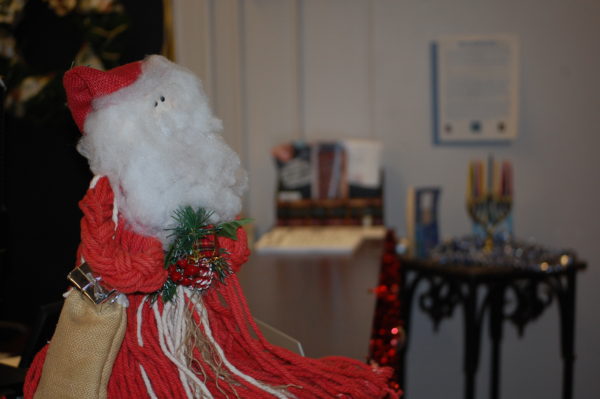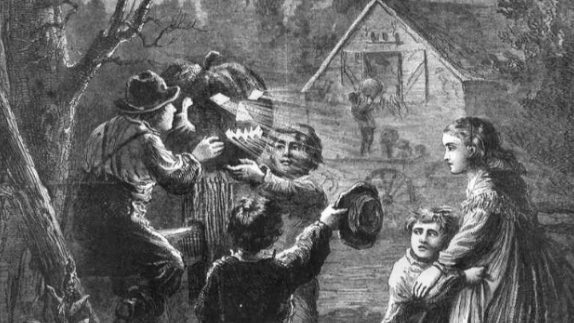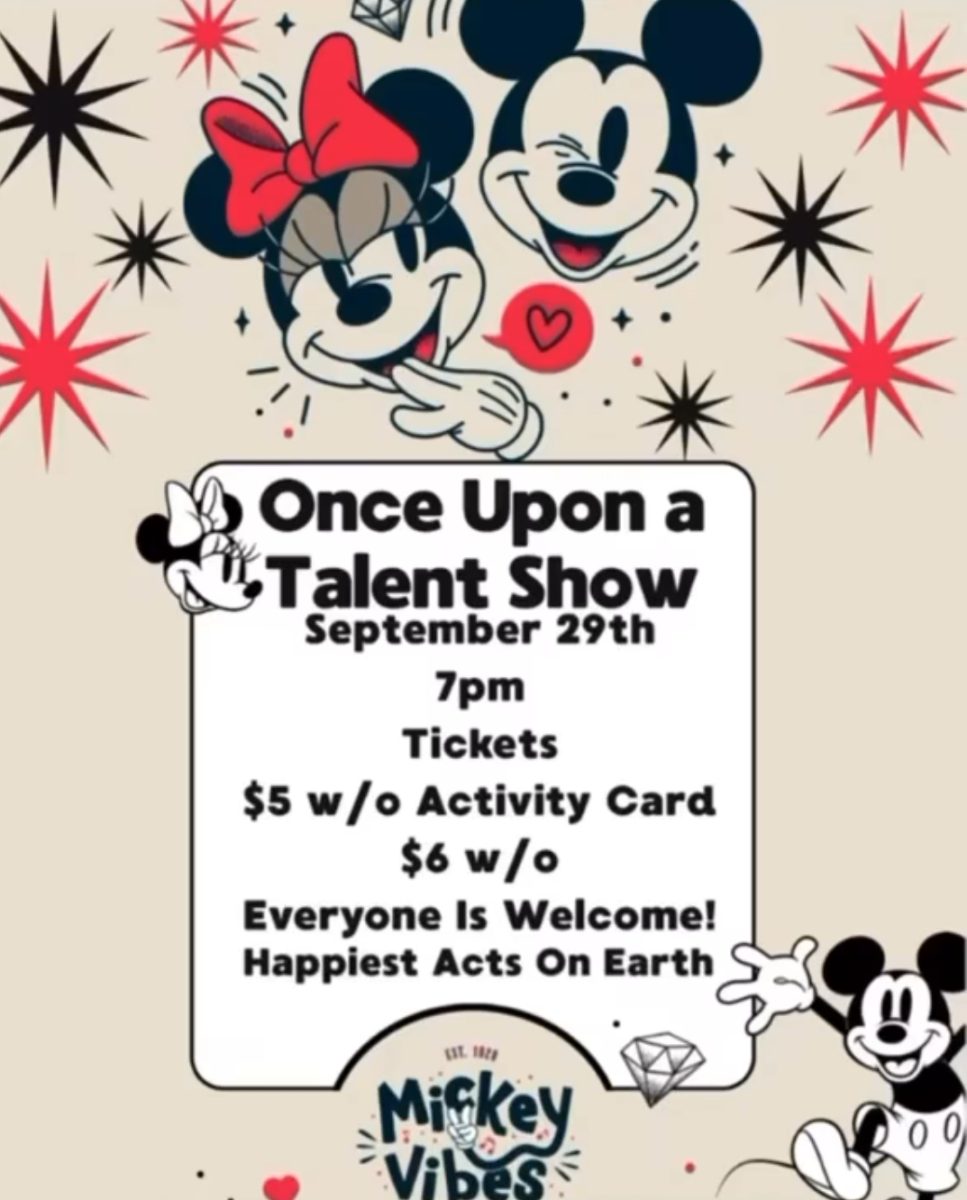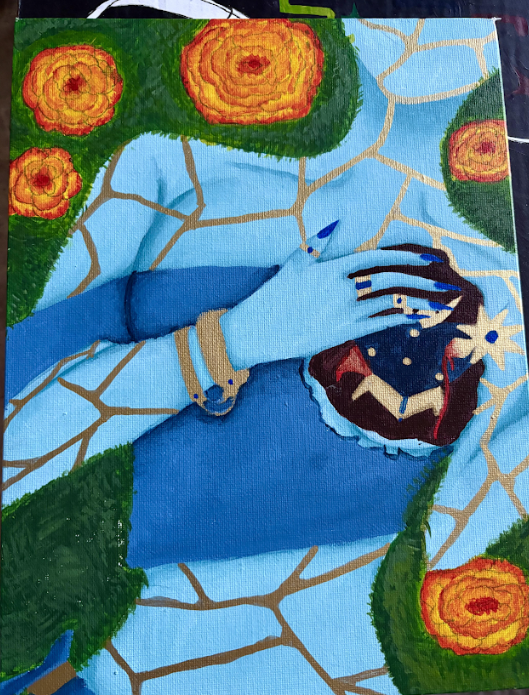Feature Photo By: Hannah Metzger- Holiday decorations within Rangeview’s Main Office. The focus on Santa Claus with a menorah faded in the background symbolizes society’s emphasis on Christmas during the holiday season.
This time of year, it seems that everyone is filled with the Christmas spirit. Families begin to put up their trees, classes plan “Secret Santas”, and students all over the school can be spotted wearing their best ugly Christmas sweaters and Santa hats; however, this jolly dream is not the reality for many. During the holiday season, other holidays and beliefs are often overlooked and outshined by the mania of Christmas.

According to the Jewish Virtual Library, only 3% of the United States population identifies as Jewish; and in Colorado, the number drops to 2.5%. While that might seem minuscule when compared to the 75% of Americans who identify as Christian (www.gallup.com), that 3% equals to over 7,160,000 people.
Several of those millions of Jewish people can be found here at Rangeview – for example, RHS counselor Mr. Hirsch. When it comes to Christmas, Hirsch has a very positive view of the holiday’s predominance in the U.S.
“I actually love Christmas,” Hirsch exclaimed. “My wife is Catholic and I grew up with a best friend who celebrated Christmas and invited me over every year to celebrate with him and his family.”
While Hirsch agrees that Hanukkah, and a “number of other non-Christmas religious holidays” are greatly overlooked during the holiday season, he finds support and a sense of community within the mass celebration of Christmas.
“Even though we may not share the same religion, I find that there is much overlap between our beliefs, especially about our emphasis on love, generosity, joy, and family,” explained Hirsch. “I feel like that is what Christmas represents, so I do not feel disconnected from it.”
Hirsch is not alone with this belief. Mr. Hill, a Rangeview theatre teacher, was raised both Jewish on his mother’s side and Christian on his father’s side.
“Growing up I had a Christmas tree and a menorah in the same room,” claimed Hill.
Practicing both religions and celebrating both Christmas and Hanukkah has given Hill a unique insight on the meaning and representation of each holiday.
“If you just look at the ratio of Jews to Christians to other religions, Jews just aren’t as prominent anymore. There’s less people who celebrate Hanukkah so, yes it’s underrepresented, but it’s understandable,” explained Hill. “I don’t feel any sort of anxiety or tension [during Christmas] because, you know, my friends appreciate the things that I believe and celebrate and I understand the things that they believe and celebrate. So, it’s great, it’s fun, it’s a time for family and friends and a regular holiday season for me.”

Though, some Jewish people who haven’t been raised celebrating both Hanukkah and Christmas, like junior Ranya Marcanno, feel slightly different about society’s Christmas overload during the holiday season.
“It kinda makes me a little uncomfortable because people are like ‘what are you gonna be doing for Christmas?’ and I’m like ‘Ummm… Well, I don’t do Christmas. How about Hanukkah?’,” explained Marcanno. “I feel like people don’t take [Hannukah] into consideration. If you tell people that you don’t celebrate Christmas, the first thing they think of is, ‘Oh! So you celebrate Kwanzaa?’ and I’m like, ‘No… There’s other things that people celebrate! Or nothing at all!”
While it appears that many people of the Jewish faith found within RHS accept the popularity of Christmas during the holiday season, the lack of representation for Judaism is still an issue.
When asked if he believes that Rangeview sufficiently includes Hanukkah within it’s holiday celebrations and decorations Hirsch answered “probably not”.
“More could certainly be done,” Hirsch explained.
Marcanno agreed with Hirsch, stating that Rangeview doesn’t adequately include Hannukah “at all”.
“I guess it’d only make it weird though,” Marcanno added. “Christmas is more of a common holiday so to see Hanukkah stuff everywhere would be kinda weird and I feel like people would be put off by that.”
The dominance of Christmas can be seen throughout many of the decorations and events at Rangeview, even though they are holiday non-specific. For example, the Christmas elves plastered on the walls of the commons, the stockings hanging below the stage in the theater, and the special appearence of Santa Claus at Rangeview’s Holiday Hoopla on Monday are all focused around Christmas.

Though, as Hill pointed out, Rangeview has made a clear effort to be inclusive of other holidays and beliefs.
“All of the performance groups, like the band and the choir, do a great job of making sure they include material of a lot of different celebrations and holidays,” claimed Hill. “They’ve got some holiday representation up in the main office that’s cool, that’s inclusive of different religions, and I feel like Rangeview does a great job of making sure all [holidays] are acknowledged.”
Though the pressure and popularity of Christmas is clear all throughout the country, it appears that this imbalance of celebration doesn’t bother or shake the faith of the Jewish people within RHS.
“No, [Christmas isn’t a difficult time to be Jewish],” said Marcanno. “If any holiday were to be a difficult time to be Jewish, I would say Halloween.”
Regardless of beliefs or representation, overall, it seems that people are able to find happiness and celebration within the holidays – even if there is an emphasis on Christmas.
“…Christmas has the potential to bring out the best in people which is always a good thing,” said Hirsch. “I think if we focus on the most essential aspects of Christmas – at least as I understand them – it is a very happy time for the majority of the country and school and something to be cherished and respected. Not at the expense of other faiths or holidays, but in addition.”
It appears that, at least here at Rangeview High School, people of all different faiths feel that they’re able to come together to celebrate, or simply just appreciate, the practices and beliefs of everyone. In the end, this sense of communal harmony and respect is what the holiday season is really about.






